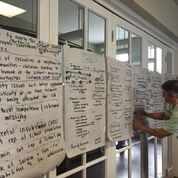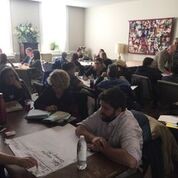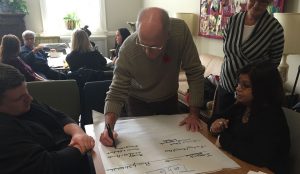


The SPNO’s KNSWB Project is focusing on the inequities and the exclusionary impacts of low income on student well-being in the education system. Both poor and lower income working class families encounter challenges with the education system.
Following a series of local stakeholder conversations in the fall of 2017, the planning session on November 3 in Toronto brought together more than 30 education equity champions from 14 communities across the province to set priorities for KNSWB Project work in Year 2. Following work in small groups to generate a list of possibilities, a rank ordering process resulted in a set of three major priorities for Project focus, which incorporate or are consistent with some of the more specific suggestions indicated in the second panel in the following chart.
| Eliminating resource inequities and disparities of low income communities and their schools
|
Raising the consciousness & understanding among educators of the inequities and exclusionary conditions facing low-income students and families. | Engaging low-income families in their schools in meaningful & inclusive ways.
|
| ~ Eliminate school fundraising and charging school fees for extracurricular activities ~
~ Increased staffing and resources to schools with many low-income families ~ ~ Fundraising (inequitable funding and problematic discourse) ~ ~ Lack of resources in rural communities ~ ~ Space/Transportation/Special program delivery/Consistency of programs/Services ~ ~ Public education campaign for parents and educators ~ ~ Teacher training on equity, inclusion and privilege ~ ~ Equity training and communication à need a consistent message ~ ~ Curriculum change (include income disparities) ~ ~ Parental exclusion barriers and lack of accessibility ~ ~ Infographic – data & lived experience of low-income students in education ~ |
||